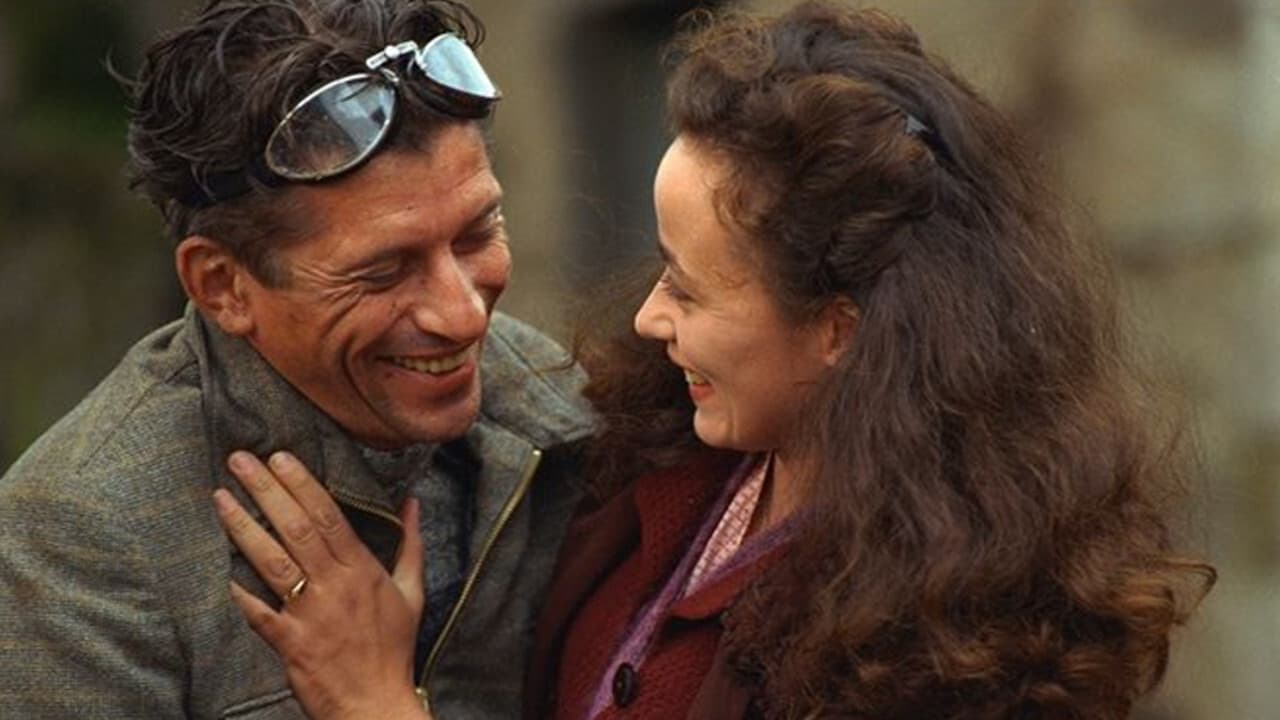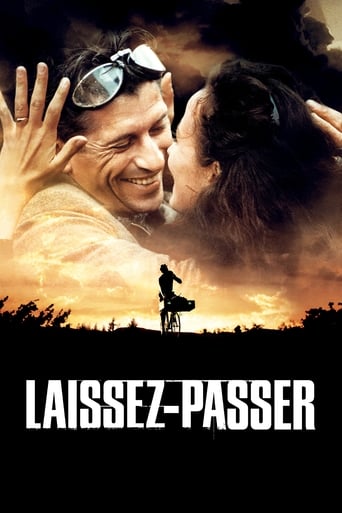

This deeply humane film is the first that I, as a child of a British generation who once faced the real and imminent possibility of life under Nazi dictatorship, have ever seen that allows me to understand just what a nightmare it was, to actually live in the collaborationist state of Vichy. How could the human soul survive such radical compromises as were required of the French every day of their war-time existence? How, except by a unique form of cultural prostitution, could people negotiate for the temporary return of their own lives, which was the best accommodation for which they could hope? Without the obvious and utterly stylized heroism beloved of the Hollywood dream-factory, and of communist ideological fantasists, alike, this film reveals and communicates more of the agony of ordinary lives under Vichy - largely through the microcosm of the 'film family' - than any other I know. The gains in such directorial and authorial humility are in the honesty this permits in the observation of the shifts people are put to to survive: Such as the dog-end scam of a floor sweeper, who encourages harried fumeurs to stub out barely-smoked cigarettes on their way to the air-raid shelter; or the retrieval of river fish, stunned by the repercussions of British bombs, detonated nearby, and their free distribution to the film crew. This process of adaptation to extreme situations comes over as deeply sympathetic. Indeed, the whole business of earning your living (for that is what it amounts to when the means of life are so scarce and so insecure) by making films to pander to your conqueror's debased notions of your culture - which films yet contrive to be, in some residual sense, an expression of your innate and irreducible Frenchness - seems to me to be all of a piece with such simple, even seedy, everyday strategies for survival, that also, and despite appearances to the contrary, permit a conquered nation to retain some semblance of its pride and integrity. Thus a captive people secretly harbours dreams of what it once was, and must be again. 'The wind must change one day' says one of the lesser characters who teem through this film.The insistence on sheer craftsmanship as a value in itself, despite the malign vagaries of German-sourced film-stock, material, and equipment, is a most eloquent rebuttal of Truffaut's somewhat facile and intemperate post-war Cahiers du Cinema rejection of most of the ill-starred war-generation of French film-makers. The fact remains that he was the talented if disturbed son of these tragic fathers, whether he chose to acknowledge them or not. (And he did have a lurking affection for some of them - Guitry, par exemple.) Of course, his rebellion has value - as who can possibly deny who appreciates the fruits of the Nouvelle Vague? We should make the effort to understand this paternity, albeit it is one that appeared only negatively influential in terms of cinema history. Indeed, Tavernier sees that it is time that justice was done to this lost generation of film makers. Further, he divines that their metier was a microcosm of a France effectively governed by Germany.Therefore, it is with a shock, that, towards the end of the film, we are introduced, during Devaivre's unexpected debriefing session in England, to a proud and still independent people who are clearly managing to hold their own against Hitler; a people whose straightforwardness - even bluntness - grates unavoidably against the psychologically complex reality of the Occupation, which the Frenchman despairs of communicating to them. This wonderful scene, which is full of a balanced, good-natured satire, and is reminiscent of the style of Powell and Pressburger's great wartime films, has been carefully cast with English actors, and reveals Tavernier as an artist of international stature. The complexity of the course of the obscure affairs of ordinary flawed mortals towards an illumination of all that is best about human beings is almost miraculously realised. Out of the very particular, even embarrassingly private, troubles of his country in those dark days, he has fashioned both a detailed account of the experience for his fellow-countrymen (and francophiles!), and a moving drama of the human spirit under adversity, that should rank this work amongst the greatest films of war-time. To understand is (indeed) to forgive. This film allows us to comprehend a very dark chapter in the history of France. This is how most British people would have lived, I'm sure, if the whole of Britain had gone the way of the Channel Islands. I really don't see any reason for the French to be embarrassed by such a film: It explains them to the world, in terms of their own experience. Clearly, collaboration was no cake-walk - more a Purgatory for an entire nation.
... View MoreFar and away the best of the recent spate of WW11 movies from France this is also the only one to have played in England. It is inevitable that an Englishman living in a country that was never occupied and with no real first-hand knowledge of WW11 will look at this - or any film on the same subject - with different eyes from a French viewer, especially a French viewer whose memories encompass the years in question. For me, an Englishman, who loves craftsmanship, be it French, Italian, English or American, and has only contempt for the infamous essay in which Truffaut attacked the values personified by, among others, scriptwriter Jean Aurenche, who is a character in this film, and Tavernier, who made the film, a great deal of the pleasure was in Tavernier's defence of Aurenche and the 'well-made' school of filmmaking, but over and above that what we have is almost three hourse of superb storytelling and an evocation of a turbulent time. Denis Polyades (currently on French screens in a tasty remake of The Yellow Room Mystery (Le Mystere de la chambre jaune) is excellent as Aurenche although of course I never knew Aurenche other than via his great screenplays but Tavernier did know him and so presumably guided Polyades to a true portrait. French film buffs will be well versed in the period when 'Contintental' films was active under German control and will, theoretically, share my fascination in any light from whatever quarter that can be shed on it. I saw this movie initially in a small Paris Art House where it played after its initial release and, not unexpectedly in the Latin Quartier and just down the block from the Sorbonne, there were several students in the audience - for that matter out of, at a guess, 120-150 patrons about two thirds of them were under 50 and, by definition, could have no first-hand knowledge of wartime Paris - yet the film was greeted with respect and applause. I subsequently saw it in London, subtitled and with, presumably, a predominently English audience, and it was greeted much the same way.I accept that not everyone takes the view that I do, namely, that movies, like plays, novels, or any creative form, benefit from craftsmanship and professionalism, equally not everyone will despise the Truffauts of this world who thrive on iconaclism for its own sake - ironically, as I've remarked elsewhere, Truffaut eventually began to turn out exactly the same kind of well-crafted movie on which he had poured so much vitriol - but for like-minded film buffs there is so much to delight in when master craftsmen like Tavernier (and, to a lesser ambitious extent, Francis Werber, who is single-handedly filling the void left by Billy Wilder) unveil a new film.
... View MoreI know I must resist the temptation to comment other reviews, so I'll let the title of mine shows what lead me to react. This Tavernier's opus is one of his most achieved work. The French filmmaker (and historian and archivist of cinema) is doing a revision, for sure, and breaking some codes of the reigning (and ageing) French political correctness ; besides, it doesn't make his movie a rehabilitation of the "régime de Vichy", neither Tavernier a glorifyer of French fascism. The film is simply pointing some facts that have been seldom told about filmmaking during the German occupation of France (from June 1940 to summer 1944). Tavernier talks about passion for filmmaking and reluctance to work under German or fascist rules, about need to stay a professionnal and despair to be endangered by a war still going on and Gestapo of Milice sending their murderers even in the studios. Furthermore, Tavernier talks about the role and place of the Communist party (joining French resistance after June 41...), a place which is rarely evoked in its most unpleasant aspects, usually. Let's remember that Clouzot's "le Corbeau" was tagged a collaborationnist film, and subsequantly his author blacklisted for a year, only because HG Clouzot didn't support the Communist party linked "Comité d'épuration" in the end of 1944. This is also of what "laissez-passer" is dealling with. Of a very classic form, excellently acted, this movie has the considerable merit of revisiting a period which is remembered as well as one of the darkest in French political and social history, and paradoxically as one of the most brilliant in French cinema history. A last word on Tavernier's conceptions of social duties for an intellectual : most of his works are giving the point of view of people having to deal with real life and what they understand as their duty ; those people are shown in fictions (the policeman in "L 627", the best ever made movie on police work ; the teacher in "une semaine de vacances") or documentaries ("la guerre sans nom"). Tavernier give them a right to free speach which makes his movies sort of manifestos in defense of the Republic and democracy. For this too, he'll be remembered, as he'll be honoured for his positions (by political means or by filmmaking, as "double peine") to support immigrant workers.
... View MoreBertrand Tavernier is, arguably, the greatest living director of French films, and "Laissez-Passer" ("Safe Conduct") is his masterpiece. By recreating the working and personal lives of two actual French artists, screenwriter Jean Auranche and director Jean Devaivre, Tavernier provides a rich tapestry -- at once funny, tender, exciting, and moving -- of the French film industry during the darkest days of World War II. Although the studio for which Auranche and Devaivre worked was under Nazi patronage and control, almost every writer, director, and technician who made French comedies, dramas,and musicals tried to subvert Nazism by subtly incorporating themes of revolt and resistance into the films they made. Tavernier asserts this truth while he explores his heroes' real-life participation in the French underground: stealing German documents and passing these on to the Allies and finding jobs for creative, but indigent, friends. Moreover, the affection with which Auranche and Devaivre regarded the cinema talent of their days -- Pierre Fresnay, Raimu, Danielle Darrieux, Harry Baur, even the lightly satirized Fernandel -- is part of Tavernier's epic vision of the French film scene of its time. And he gives us invaluable insights into how brave people continued to work at their craft despite the poverty, hunger, and oppression they suffered daily. It's a pity that some of Tavernier's younger critics cannot appreciate either his concepts or his visually fluid and arresting style (for sheer cinematic beauty, he captures the squalor of everyday French life during the Resistance by alternating it with glowing sequences of the country's rural life). "Laissez-Passer" is faultlessly acted; seldom has such a large cast of players -- of all ages -- been in such beautiful synch with a director.
... View More